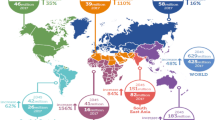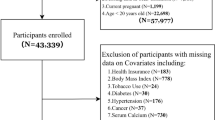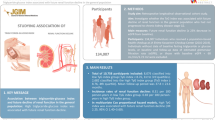Abstract
Adiponectin encoded by ADIPOQ, gene (adiponectin, C1Q and Collagen Domain-Containing) is an adipocyte-derived protein, plays a major role in mediating insulin sensitivity, and lower plasma adiponectin concentration has been linked to microangiopathies in type 2 diabetes mellitus (DM). It has been hypothesized that blood adiponectin concentration may reflect the extent of kidney damage in diabetic patients. Our aim was to study genetic polymorphisms in adiponectin genes (ADIPOQ +45 T/G and adiponectin receptor 1 (ADIPOR1) −106 A/G) and the serum level of adiponectin in type 2 DM and to correlate this with the stages of diabetic nephropathy. Forty-eight patients with type 2 DM were recruited from Internal Medicine Department and Nephrology Outpatient Clinic in Kasr El Aini Hospital, Cairo University, from April 2011 until March 2012. They were divided into normoalbuminuric (nonnephropathic), n = 17; and nephropathic group, n = 31; who were further subdivided into microalbuminuric, macroalbuminuric, and end-stage renal disease groups. They were compared to ten healthy control subjects. Blood urea, creatinine, HbA1c, and adiponectin were measured. ADIPOQ +45 T/G and ADIPOR1 −106 A/G gene polymorphisms were analyzed by PCR RFLP. Serum adiponectin was significantly lower in nephropathic group versus nonnephropathic and control group (P = 0.026) with the lowest level in macroalbuminuric group (P < 0.001). Serum urea, blood glucose, HbA1c, and duration of diabetes were found to be independent predictors of adiponectin level, r 2 = 0.59. In case of ADIPOQ, most of the cases carried the TT genotype, and there was absence of GG genotype in both cases and control. The ADIPOR1 gene polymorphism was strongly associated with type 2 DM and diabetic nephropathy. The G allele of ADIPOR1 was found to be a risk factor for type 2 DM with OR 3.1 (95 % confidence interval 1.1–8.5), P = 0.028. This evidence highlights the role of ADIPOR1 in the pathogenesis of diabetic nephropathy and type 2 diabetes (T2D), suggesting AdipoR1 as a promising target for the treatment of T2D patients, particularly those who have microalbuminuria. Also, adiponectin serum level is a biomarker for kidney disease and may be targeted for prevention and treatment.



Similar content being viewed by others
References
Ahima RS (2008) Linking adiponectin to proteinuria. J Clin Invest 118(5):1645–1656
American Diabetes Association (2008) Diagnosis and classification of diabetes mellitus. Diabetes Care 31:S55–S60
An WS, Son YK, Kim SE, Kim KH, Bae HR, Lee S, Park Y, Kim HJ, Vaziri ND (2011) Association of adiponectin and leptin with serum lipids and erythrocyte omega-3 and omega-6 fatty acids in dialysis patients. Clin Nephrol 75(3):195–203
Dronavalli S, Duka I, Bakris GL (2008) The pathogenesis of diabetic nephropathy. Nat Clin Pract Endocrinol Metab 4:444–452
Han LY, Wu QH, Jiao ML, Hao YH, Liang LB, Gao LJ, Legge DG, Quan H, Zhao MM, Ning N, Kang Z (2011) Associations between single-nucleotide polymorphisms (+45 T > G, +276G > T, −11377C > G, −11391G > A) of adiponectin gene and type 2 diabetes mellitus: a systematic review and meta-analysis. Diabetologia 54(9):2303–2314, Epub 2011 Jun 3
Hattersley AT, Pearson ER (2006) Minireview: pharmacogenetics and beyond: the interaction of therapeutic response, beta-cell physiology, and genetics in diabetes. Endocrinology 147:2657–2663
Hu E, Liang P, Spiegelman BM (1996) AdipoQ is a novel adipose specific gene dysregulated in obesity. J Biol Chem 271:10697–10703
Kadowaki T, Yamauchi T (2005) Adiponectin and adiponectin receptors. Endocr Rev 26:439–451
Kollerits B, Fliser D, Heid IM, Ritz E, Kronenberg F (2007) Gender-specific association of adiponectin as a predictor of progression of chronic kidney disease: the Mild to Moderate Kidney Disease Study. Kidney Int 71:1279–1286
Lee YJ, Cho S, Kim SR (2011) The association between serum adiponectin levels and nutritional status of hemodialysis patients. Ren Fail 33(5):506–511
Levey AS, Stevens LA (2009) A new equation to estimate glomerular filtration rate. Ann Intern Med 150:604–612
Looker HC, Krakoff J, Funahashi T et al (2004) Adiponectin concentrations are influenced by renal function and diabetes duration in Pima Indians with type 2 diabetes. J Clin Endocrinol Metab 89:4010–4017
Maeda K, Okubo K, Shimomura I, Funahashi T, Matsuzawa Y, Matsubara K (1996) cDNA cloning and expression of a novel adipose specific collagen-like factor, apM1 (adipose most abundant gene transcript 1). Biochem Biophys Res Commun 221:286–289
Mather KJ, Christophi CA, Jablonski KA, Knowler WC, Goldberg RB et al (2012) Common variants in genes encoding adiponectin (ADIPOQ) and its receptors (ADIPOR1/2), adiponectin concentrations, and diabetes incidence in the Diabetes Prevention Program. Diabet Med. doi:10.1111/j.1464-5491
Mathiesen ER, Ronn B, Storm B, Foght H, Deckert T (1995) The natural course of microalbuminuria in insulin-dependent diabetes: a 10-year prospective study. Diabet Med 12:482–487
Mogensen CE, Chachati A, Christensen CK et al (1985) Microalbuminuria: an early marker of renal involvement in diabetes. Uremia Invest 9:85–95
Nishihara T, Matsuda M, Araki H, Oshima K, Kihara S et al (2006) Effect of adiponectin on murine colitis induced by dextran sulfate sodium. Gastroenterology 131:853–861
Ouchi N, Kihara S, Arita Y, Okamato Y, Maeda K, Kuriyama H et al (2000) Adiponectin, an adipocyte-derived plasma protein, inhibits endothelial NF-kB signalling through a cAMP-dependent pathway. Circulation 102:1296–1301
Parving H-H, Gall M-A, Skøtt P et al (1992) Prevalence and causes of albuminuria in non-insulin-dependent diabetic patients. Kidney Int 41:758–762
Potapov VA, Chistiakov DA, Dubinina A, Shamkhalova MS, Shestakova MV, Nosikov VN (2008) Adiponectin and adiponectin receptor gene variants in relation to type 2 diabetes and insulin resistance-related phenotypes. Rev Diabet Stud 5(1):28–37, Spring
Remuzzi G, Schieppati A, Ruggenenti P (2002) Clinical practice. Nephropathy in patients with type 2 diabetes. N Engl J Med 346:1145–1151
Ryan AS, Berman DM, Nicklas BJ et al (2003) Plasma adiponectin and leptin levels, body composition, and glucose utilization in adult women with wide ranges of age and obesity. Diabetes Care 26:2383–2388
Sale MM, Freedman BI (2006) Genetic determinants of albuminuria and renal disease in diabetes mellitus. Nephrol Dial Transplant 21:13–16
Sharma K, Ramachandra RS, Qiu G, Usui HK, Zhu Y et al (2008) Adiponectin regulates albuminuria and podocyte function in mice. J Clin Invest 118:1645–1656
Siitonen N, Pulkkinen L, Mager U, Lindstrom J, Eriksson JG, Valle TT, Hamalainen H, Ilanne-Parikka P, Keinanen-Kiukaaniemi S, Tuomilehto J et al (2006) Association of sequence variations in the gene encoding adiponectin receptor 1 (ADIPOR1) with body size and insulin levels. The Finnish Diabetes Prevention Study. Diabetologia 49:1795–1805
Stenvinkel P, Marchlewska A, Pecoits-Filho R, Heimburger O, Zhang Z, Hoff C, Holmes C, Axelsson J, Arvidsson S et al (2004) Adiponectin in renal disease: relationship to phenotype and genetic variation in the gene encoding adiponectin. Kidney Int 65:274–281
Vasseur F, Meyre D, Froguel P (2006) Adiponectin, type 2 diabetes and the metabolic syndrome: lessons from human genetic studies. Expert Rev Mol Med 8:1–12
Vaxillaire M, Dechaume A, Vasseur-Delannoy V, Lahmidi S, Vatin V, Lepretre F, Boutin P, Hercberg S, Charpentier G, Dina C et al (2006) Genetic analysis of ADIPOR1 and ADIPOR2 candidate polymorphisms for type 2 diabetes in the Caucasian population. Diabetes 55:856–861
Weyer C, Funahashi T, Tanaka S, Hotta K, Matsuzawa Y, Pratley RE, Tataranni PA (2001) Hypoadiponectinemia in obesity and type 2 diabetes: close association with insulin resistance and hyperinsulinemia. J Clin Endocrinol Metab 86:1930–1935
Yamauchi T, Kamon J, Ito Y, Tsuchida A, Yokomizo T, Kita S, Sugiyama T, Miyagishi M, Hara K, Tsunoda M et al (2003) Cloning of adiponectin receptors that mediate antidiabetic metabolic effects. Nature 423:762–769
Yano Y, Hoshide S, Ishikawa J et al (2007) Differential impacts of adiponectin on low-grade albuminuria between obese and nonobese persons without diabetes. J Clin Hypertens 9:775–782 (Greenwich)
Yilmaz MI, Saglam M, Qureshi AR, Carrero JJ, Eyileten T et al (2008) Endothelial dysfunction in type-2 diabetics with early diabetic nephropathy is associated with low circulating adiponectin. Nephrol Dial Transplant 23:1621–1627
Yoshioka K, Yoshida T, Umekawa T, Kogure A, Takakura Y, Toda H, Yoshikawa T (2004) Adiponectin gene polymorphism (G276T) is not associated with incipient diabetic nephropathy in Japanese type 2 diabetic patients. Metabolism 53(9):1223–1226
Author information
Authors and Affiliations
Corresponding author
Rights and permissions
About this article
Cite this article
Kamal, M., Roshdy, M. & ElKhatib, M. The association of adiponectin serum level and ADIPOQ +45 T/G and ADIPOR1 −106 A/G gene polymorphisms with diabetic nephropathy in type 2 DM. Comp Clin Pathol 23, 53–60 (2014). https://doi.org/10.1007/s00580-012-1569-4
Received:
Accepted:
Published:
Issue Date:
DOI: https://doi.org/10.1007/s00580-012-1569-4




